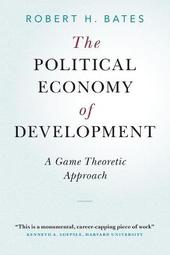
|
The Political Economy of Development: A Game Theoretic Approach
Paperback / softback
Main Details
| Title |
The Political Economy of Development: A Game Theoretic Approach
|
| Authors and Contributors |
By (author) Robert H. Bates
|
| Series | Cambridge Studies in Comparative Politics |
|---|
| Physical Properties |
| Format:Paperback / softback | | Pages:200 | | Dimensions(mm): Height 150,Width 230 |
|
| Category/Genre | Political economy |
|---|
| ISBN/Barcode |
9781108930932
|
| Classifications | Dewey:338.9 |
|---|
| Audience | | Professional & Vocational | | Tertiary Education (US: College) | |
|---|
| Illustrations |
Worked examples or Exercises
|
|
Publishing Details |
| Publisher |
Cambridge University Press
|
| Imprint |
Cambridge University Press
|
| Publication Date |
29 October 2020 |
| Publication Country |
United Kingdom
|
Description
Those studying development often address the impact of government policies, but rarely the politics that generate these policies. A culmination of several decades of work by Robert Bates, among the most respected comparativists in political science, this compact volume seeks to rectify that omission. Bates addresses the political origins of prosperity and security and uncovers the root causes of under-development. Without the state there can be no development, but those who are endowed with the power of the state often use its power to appropriate the wealth and property of those they rule. When do those with power use it to safeguard rather than to despoil? Bates explores this question by analyzing motivations behind the behaviour of governments in the developing world, drawing on historical and anthropological insights, game theory, and his own field research in developing nations.
Author Biography
Robert H. Bates, Eaton Professor Emeritus of the Science of Government at Harvard University, is the author, co-author, or editor of over a dozen books on the developing world. He specializes on the study of conflict and Africa, where he has spent much of his research career. A member of the American Academy of Arts and Sciences and National Academy of Sciences, he has held professorships at the California Institute of Technology, Duke University and the Toulouse School of Economics.
|